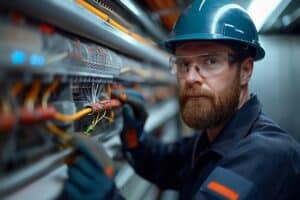Electrical issues in industrial settings are more than just inconvenient—they can be downright dangerous and costly. From complex machinery to high-power systems, your industrial electrical setup plays a vital role in keeping everything running smoothly. If something goes wrong, it’s not always easy to spot the issue without the right expertise. Here are seven warning signs that it’s time to call in an industrial electrician to address those potential hazards before they turn into a major problem.
1. Frequent Breaker Trips or Blown Fuses
Industrial facilities rely on high-powered equipment and machinery, which can put a lot of strain on your electrical system. If you’re noticing that circuit breakers are frequently tripping or fuses are blowing, it’s a clear sign that something’s wrong. These trips are designed to protect your system, but if they’re happening regularly, it could be a sign of overloaded circuits, faulty wiring, or even problems with the main distribution panel. An industrial electrician will assess your system’s load and upgrade the wiring or electrical panels to ensure they can handle the increased demand from your equipment.
2. Power Surges and Voltage Fluctuations
If you’re experiencing power surges or voltage fluctuations, your machinery and sensitive equipment could be at risk of serious damage. These electrical issues are often caused by problems with your electrical panel, such as poor connections or outdated components. In an industrial setting, even a brief surge can fry motors, sensors, and other costly machinery. An industrial electrician can investigate the cause of these fluctuations and replace outdated equipment or make adjustments to the electrical system to prevent future damage. This will help avoid unnecessary downtime and protect your expensive assets.
3. Overheating Electrical Equipment
High temperatures around electrical systems or equipment are always a red flag in industrial environments. If you notice that motors, panels, or wiring are getting hot, it could indicate a problem with the system’s capacity to handle the load. Overheating can cause severe damage to equipment and may even result in a fire. An industrial electrician will inspect your system to identify the source of the heat and recommend appropriate solutions, such as improving ventilation, upgrading electrical components, or adding new circuits.
4. Excessive Wear and Tear on Electrical Wiring
In industrial environments, electrical wiring undergoes constant wear and tear due to vibrations, heat, and exposure to chemicals or moisture. Over time, this can result in frayed wires or exposed electrical connections, which pose a serious risk of short circuits or even fires. If you notice any visible damage to your wiring or if you’ve had issues with electrical shocks or arcing, it’s crucial to call an industrial electrician right away. They will ensure your wiring is up to code, replace damaged cables, and reinforce weak spots to prevent potential hazards.
5. Sparks or Burning Smells from Electrical Components
Sparks, smoke, or burning smells emanating from electrical panels, outlets, or equipment are never something to ignore. These signs point to a potentially dangerous electrical issue, such as faulty wiring, loose connections, or equipment overheating. In an industrial setting, these problems can quickly escalate into major hazards. If you detect these warning signs, it’s essential to shut down the affected system and contact an industrial electrician immediately. They will pinpoint the problem and ensure that all electrical components are safe and functioning properly.
6. Electrical Shortages or Equipment Failures
If certain machines or sections of your facility experience frequent electrical shortages or failures, the issue could be with your electrical supply. Industrial systems often use a complex network of transformers, circuit boards, and relays, and if any part of this system starts malfunctioning, it can cause partial or complete failures. This could lead to production delays, equipment damage, and even safety hazards. A qualified industrial electrician will conduct a comprehensive inspection of your entire electrical setup, identifying faults, ensuring proper grounding, and making necessary repairs to restore reliable service.
7. Unusual Noises Coming from Electrical Systems
In industrial environments, electrical systems should run relatively quietly. If you hear humming, buzzing, or crackling noises coming from electrical panels or machinery, it’s a sign that something isn’t right. These noises typically indicate problems such as faulty wiring, poor connections, or overloaded circuits. In some cases, it could mean that equipment is operating inefficiently, which can lead to overheating or equipment failure. A qualified industrial electrician can trace the source of these sounds and resolve the issue before it becomes a more significant problem.
Don’t Wait for Disaster to Strike
Electrical problems in industrial settings require prompt attention. Neglecting warning signs can lead to costly repairs, increased downtime, and even dangerous accidents. By addressing these issues early with the help of a professional industrial electrician, you can ensure that your electrical systems are safe, efficient, and up to code.
Whether it’s upgrading outdated wiring, fixing overheating issues, or resolving frequent power surges, an industrial electrician will bring the necessary expertise to keep your systems running smoothly. The longer you wait to address these issues, the more likely it is that they will snowball into larger, more expensive problems. So, don’t hesitate—if you spot any of these warning signs, get in touch with an industrial electrician today.

